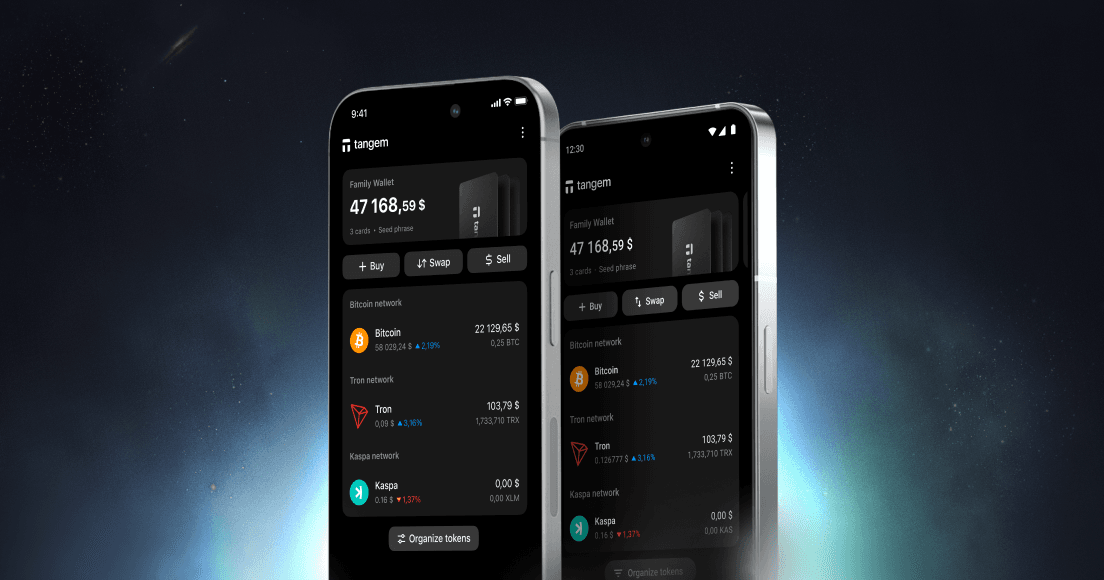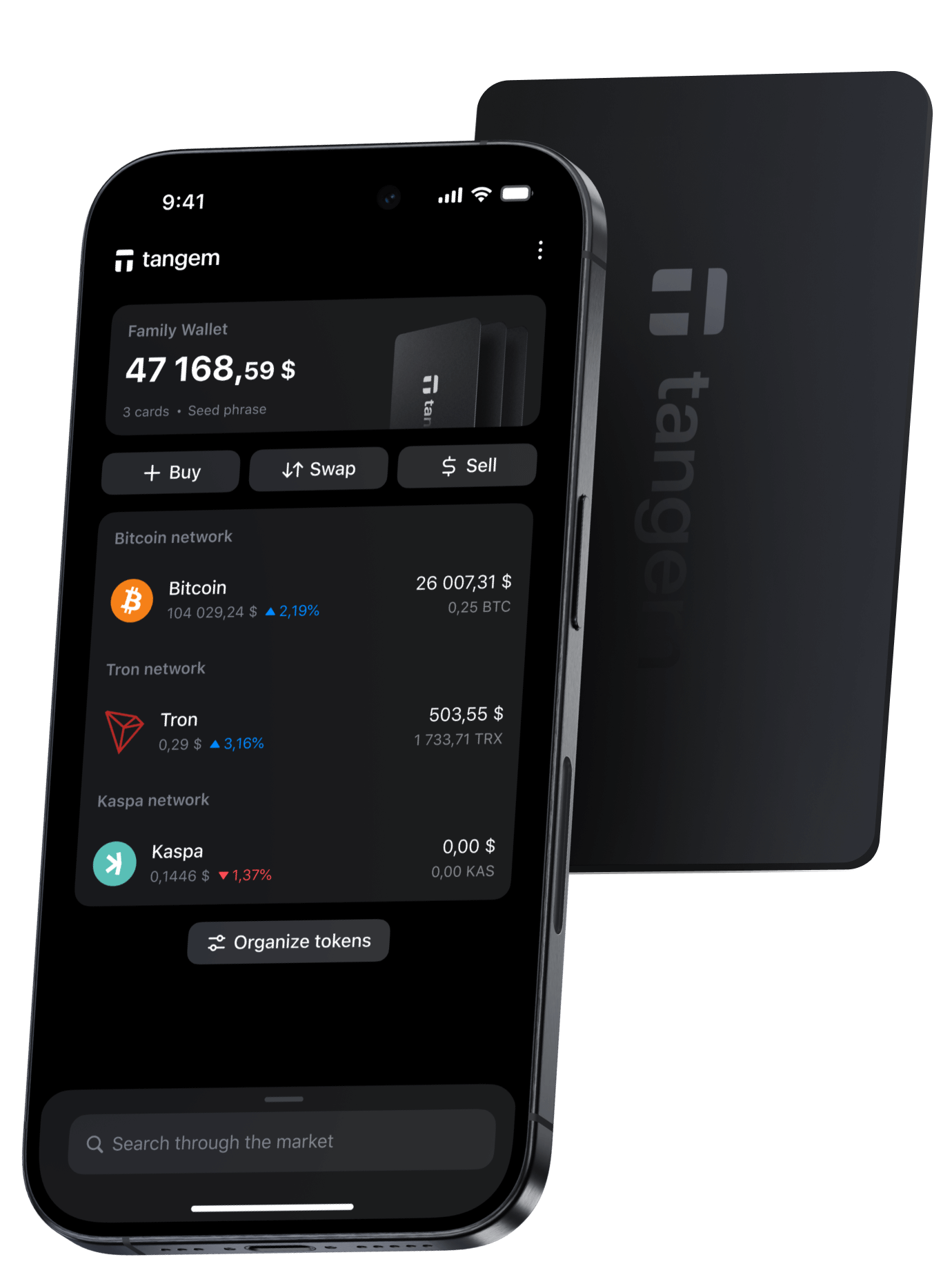
iXledger wallet
The most secure hardware wallet for your iXledger
Keep your iXledger secure with our trusted Tangem Wallet. Join a community prioritizing self-custodial safety!

How to secure your iXledger with Tangem?
When you buy or hold iXledger in Tangem, it secures your private keys in many ways:
- With the seedless setup and smart backups on extra devices, your Bitcoin is safe and accessible only to you.
- Tangem is IP69K water and dustproof, built to protect against extreme temperatures, EMPs, ESCs, and X-RAYS.
- An access code and biometric authentication protect against unauthorized access.
- Private keys are generated and stored on its EAL6+ CC secure element.
How to get a iXledger Crypto Wallet?
Tangem products are for everyone, from beginners to experts. They keep your crypto safe and easy to manage. With cutting-edge technology, Tangem lets you control and protect your digital assets.
Get TangemWhy choose iXledger wallet with Tangem.
What is iXledger (IXT)?
iXledger, launched in London in 2017, is at the forefront of revolutionizing the insurance industry with blockchain technology. It emerged to address client demand for enhanced efficiency through modern technologies. iXledger's mission is to offer a pioneering alternative to mainstream insurance platforms.
What is an iXledger wallet?
An iXledger wallet securely stores private keys, enabling you to manage your iXledger (IXT) addresses. It's important to note that the wallet itself doesn't contain your cryptocurrency; your iXledger tokens are safely held on the blockchain. The wallet's chief role is in generating and securing these private keys, thus facilitating access to and management of your iXledger-related accounts. Essentially, an iXledger wallet is indispensable for storing, sending, receiving, and managing your IXT.
How does an iXledger wallet work?
iXledger wallets operate using pairs of public and private keys to handle blockchain transactions. Your private key must remain secure, as it controls access to specific iXledger accounts, while the public key is shared to receive iXledger. The corresponding private key is essential for transferring funds. In a Tangem Wallet, these keys are generated and stored securely within its hardware.
What are the types of iXledger wallets?
Exchange iXledger Wallets:
Centralized platforms such as Binance, Coinbase, or Kraken, provide custodial wallets enabling iXledger trading with fiat money. However, they come with risks like potential access loss.Software iXledger Wallets:
These are installed on devices, allowing iXledger management through private key storage. Though user-friendly, they are susceptible to malware and hacking risks, encompassing mobile, desktop, and browser categories.Mobile iXledger Wallets:
Smartphone applications that facilitate the control of iXledger.Desktop iXledger Wallets:
Software installed on PCs that store private keys on local storage devices.Hardware iXledger Wallets:
They offer offline safeguarding for iXledger, with Tangem being a prominent example, protecting against digital threats.
How to Choose the Best iXledger Wallet
Selecting the ideal wallet boils down to personal preferences, focusing on ease of use, trustworthiness, sturdiness, and security. For robust protection against online risks and to securely handle sizeable funds, opting for a hardware wallet, such as Tangem, is advisable.

Tangem supports other cryptocurrencies
Reliability and convenience at your fingertips. Manage thousands of cryptocurrencies with peace of mind anywhere and anytime
See all supported cryptosiXledger FAQ
- You can buy iXledger on major cryptocurrency exchanges like Binance, Coinbase, or Kraken. You can also use P2P platforms or specialized exchange services. For safe storage, it is recommended to use a reliable wallet like Tangem.
- For long-term storage of iXledger, a cold wallet such as Tangem is the best choice, offering a high level of security. For active transactions, a hot wallet is more convenient but less protected from hacking.
- Transfer fees for iXledger depend on the blockchain network load and the exchange or wallet used. Typically, this includes a network fee (gas fee) and possibly additional fees from the platform.
- To create a wallet for iXledger, install the Tangem app, follow the instructions to set up a cold wallet, and generate a unique address for storing your cryptocurrency.
- Definition. Short for decentralized finance, DeFi isan umbrella term for peer-to-peer financial services on public blockchains, primarily Ethereum.
- Can I insure my cryptocurrency wallet?Yes, Canopius offers protection for cryptocurrency wallets, including coverage for cyberattacks, fraudulent transactions, and unauthorised access to digital wallets.
- inSure DeFi isa Decentralized Insurance Ecosystem, trusted by thousands of community members to protect their crypto portfolios from scams, exchange closures, and drastic devaluations. inSure DeFi provides insurance solutions for the crypto space to stabilize and secure Crypto & DeFi portfolios.
- Insurance is a way to manage your risk. When you buy insurance, youpurchase protection against unexpected financial losses. The insurance company pays you or someone you choose if something bad happens to you. If you have no insurance and an accident happens, you may be responsible for all related costs.
- Cryptocurrency insurancetypically covers virtual assets that are lost or stolen under specific conditions. For example, if the exchange where you stored your private keys is hacked and your funds are stolen, you may be covered—provided the exchange has a policy for such incidents.
- FDIC deposit insurance covers deposit products offered by insured banks, such as checking accounts and savings accounts.Deposit insurance does not apply to non-deposit products, such as stocks, bonds, money market mutual funds, securities, commodities, or crypto assets.
- Faulty smart contracts are among the most common risks of DeFi. Malicious actors eager to steal users' funds can exploit smart contracts that have weak coding. Most decentralized exchanges enable trading through the use of liquidity pools. These pools generally lock two cryptocurrencies in a smart contract.

Something went wrong

